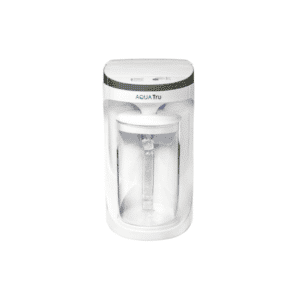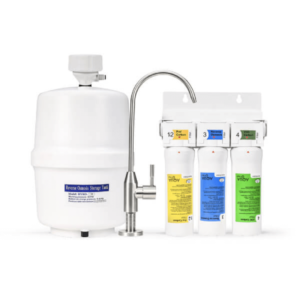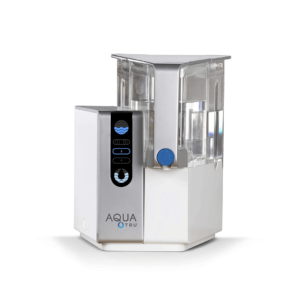Looking for a guide to choosing the best bottled water brands? I’ve got you covered! The market is flooded with options, making it crucial to understand the impact of water quality on your well-being and the importance of maintaining clean and healthy hydration. So, what should you look for? What are the best bottled water brands?
Keep reading to learn more about the healthiest & best bottled drinking water. Let’s dive in.
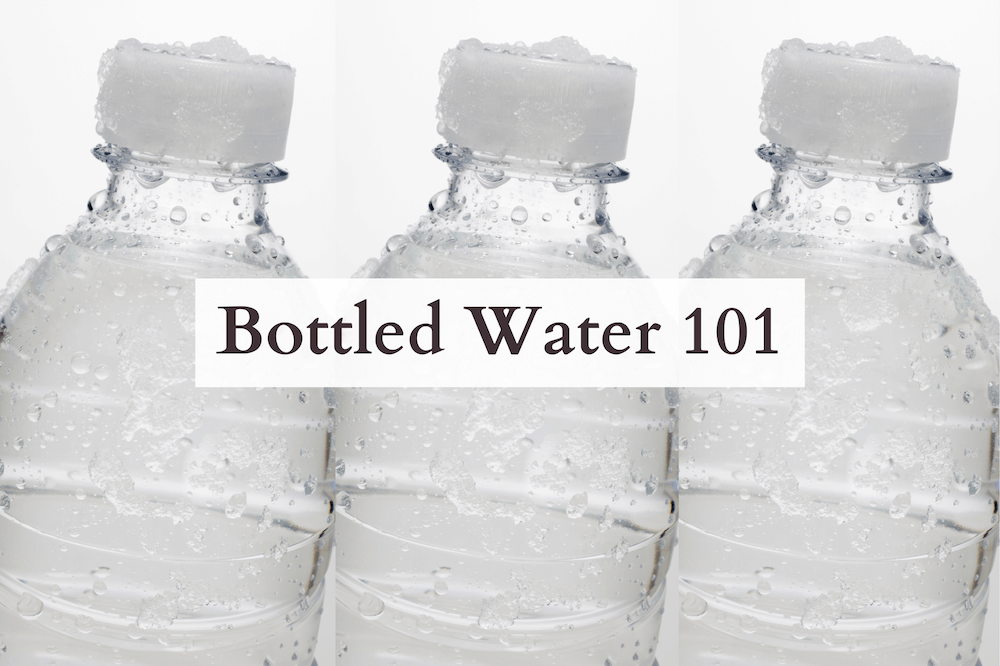
Note: This article contains affiliate links, meaning In On Around will make a small commission at no additional cost to you. This helps us maintain the site. As always, we value full transparency & only work with brands we love and trust.
Author: In On Around Founder & CEO, Catherine Power.
- Published On: November 27, 2023
- Updated On: April 10, 2024
Table of Contents
Why Water Quality Matters
Staying properly hydrated is a crucial aspect of maintaining good health. However, opting for any random bottled water brand to meet your daily hydration needs might not be the most prudent choice. It’s worth noting that a number of bottled water brands exhibit acidic or alkaline pH levels, use poor-quality bottle materials, and may contain additives like fluoride, which can potentially have adverse effects on your health.
Types Of Bottled Water
Let’s explore the diverse world of bottled water! Each type has its own characteristics…
- Spring Water: Spring water is sourced from natural springs and is typically characterized by its refreshing taste and mineral content.
- Purified Water: Purified water undergoes treatment processes like distillation or reverse osmosis to remove impurities, resulting in clean and neutral-tasting water.
- Mineral Water: Mineral water contains naturally occurring minerals, which can add a unique flavor and potential health benefits.
- Artesian Water: Artesian water is sourced from wells that tap into confined aquifers.
- Alkaline Water: Alkaline water has a higher pH level. As the name states, it’s more alkaline (basic, not acidic).
- Well Water: Well water is sourced from private wells and may have distinct taste and mineral characteristics based on the local aquifer.
- Sparkling Water: Sparkling water is carbonated, offering a bubbly, refreshing alternative to still water. (I’ll discuss the best sparking water options in another article)
- Flavored Water: Flavored water is infused with natural or artificial flavors.

Ingredients In Plastic Bottled Water
There are many ingredients in plastic bottled water, mostly because of ingredients potentially leaching from the bottle itself into the water.
- Polyethylene Terephthalate (PET, PETE) – this is what most plastic water bottles are made from, but it may be an endocrine disruptor. [4]
-
-
- It’s distinguishable by a “#1” on the bottom of the bottle or container.
-
- Luckily, most PET plastic is phthalate-free
- BPA – which BPA isn’t used in PET manufacturing, there have been recent studies showing BPA contamination, potentially from recycled PET (r-PET) or bottle caps [5]
- Nitrates – common contaminant in water from pesticides [6]
- Arsenic – common heavy metal contaminant in water [7]
- Other heavy metals
- Fluoride
- Bacteria [8]
- Microplastics
In fact, water bottles have an expiration date not because the water goes bad, but because the plastic goes bad. Over time, it is more likely to leach toxic substances into the drink. In rare cases, when improperly stored, bottled water can grow algae or mold.
Water taste oftentimes comes down to preference. Some people prefer a mineral-rich taste, while others prefer demineralized.
Should You Drink Distilled Water?
Drinking distilled water has both pros and cons. It’s virtually free of contaminants, making it an excellent choice, especially for individuals with specific medical conditions that require ultra-pure water. It can also be used in various household appliances, as it won’t leave mineral deposits behind.
However, some people find its taste less appealing because it lacks minerals. The process of distillation can be energy-intensive as well. Keep in mind, though, that a very small percent of minerals come from water (most comes from food), so distilled water can still be a good choice.
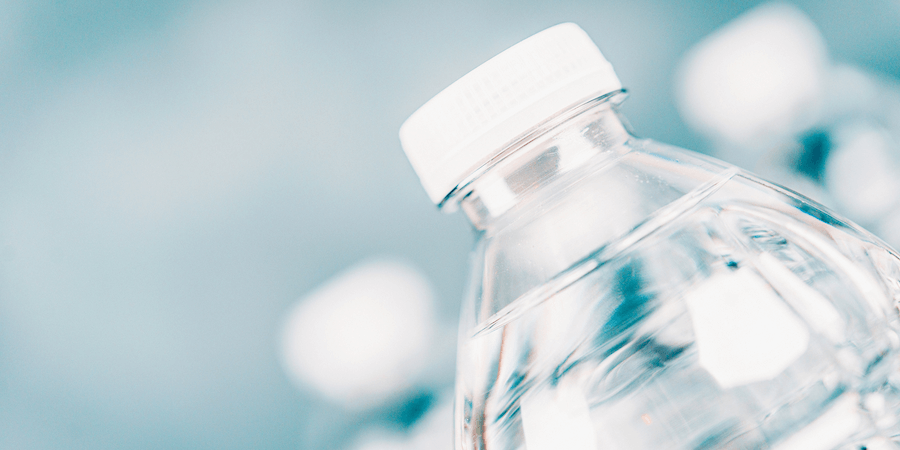
Distillation Vs. Reverse Osmosis Water
Distilled water and reverse osmosis (RO) water are both purification methods that remove impurities and contaminants. Distillation involves boiling water and then condensing the steam, which effectively removes most impurities, including minerals and microorganisms. In contrast, RO uses a membrane to filter out impurities, providing a more efficient process that retains some minerals, making it a popular choice for drinking water. Reverse osmosis is my favorite purification method.
If you’re looking for the best at-home water purifier (which is better than buying bottled water, which is costly and unsustainable), check out this article: AquaTru vs. Berkey – What To Look For In A Water Filter or Purifier.
Should You Drink Reverse Osmosis Water?
Yes, drinking reverse osmosis (RO) water can be an excellent choice for those seeking purified and clean water. RO is my favorite method of purification because it effectively removes a wide range of impurities! It’s fairly neutral in taste and is the gold standard of water purification, in my opinion.
I recommend getting an at-home reverse osmosis water purifier, like from AquaTru. Opt for their non-Alkaline, non-Bluetooth/Wi-Fi models:
-
Discount
AquaTru Glass Water Purifier (Discount Link)
With a glass container. Learn more in water purifier article. -
Discount
AquaTru Under Sink Water Purifier (Discount Link)
Our favorite! Learn more in water purifier article. -
DiscountFeatured
AquaTru Water Filter – Classic Model (Discount Link)
Our favorite. Learn more in water purifier article.
Should You Drink Alkaline Water?
The alkaline water argument is heated – some people swear by alkaline water and it’s all they drink… but I think it’s mostly a sham – sorry not sorry! I don’t think alkaline water is worth the cost or the hype… period. While it may not be inherently harmful, it’s unnecessarily more expensive. Let me explain why I’m not a fan:
Alkaline water brand claims are often questionable. Firstly, a pH level of 7 is considered neutral. When it’s above 7, you get into the alkaline range. However, alkaline water is commonly packaged in plastic bottles, which can make the water more acidic, despite the pH level the water initially started at when bottled.
Alkalization can be achieved by adding alkaline minerals such as calcium, magnesium, or potassium hydroxide, or by using ionization processes like electrolysis to separate the water into acidic and alkaline components. This process requires a lot more human input.
Most importantly, as long as your liver and kidneys are working properly, your blood pH will remain around 7.4. [12] It’s nearly impossible to change your natural pH or serum pH. Our stomachs are meant to be acidic. Our bodies are meant to stay in pH homeostasis – drinking alkaline water will not change that.
Bottled water, even if it’s “alkaline,” is not inherently better.
Spring Water Vs. Purified Water - What's The Difference?
Purified refers to the use of either distilled or reverse osmosis purifiers to bring the total dissolved solids (TDS) to under <1 ppm. Spring water is sourced directly from natural springs and typically contains minerals and trace elements, giving it a distinct taste. It also usually contains naturally occurring heavy metals.
Purified water, on the other hand, undergoes various filtration and treatment processes to remove impurities and minerals, resulting in a more neutral taste and a higher level of purity.
The Issue With Total Dissolved Solids (TDS)
The term Total Dissolved Solids (TDS) is commonly used in the context of water quality assessment. Many websites claim that you should look for water with a high amount of total dissolved solids (TDS), which can indicate high levels of minerals.
However, it’s essential to note that TDS doesn’t exclusively represent minerals and can also encompass contaminants such as heavy metals and other impurities. TDS doesn’t give us the full picture at all, hence why I’ve kept it off this article.
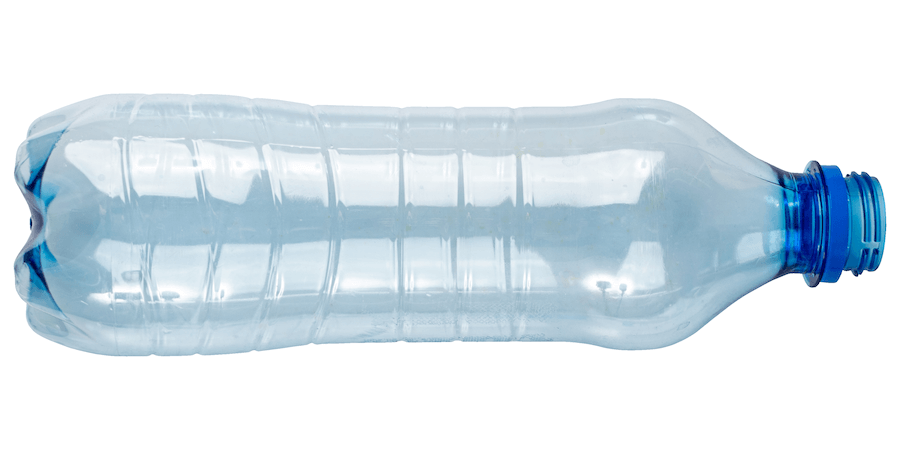
What To Look For
Look for these five things when shopping for bottled water:
- Glass bottles (and recycle or reuse them)
- Nearly neutral pH (close to 7)
- Free of flavorings
- Purified via reverse osmosis
- If you prefer spring water, only get it from a high-quality water source like specific natural springs & read their water quality report
If you’re buying bottled water, store it in a dark, dry, and cool place (away from heat), like a pantry. Make sure it’s not in the sun.
Reverse osmosis is the best water purification method, in my opinion.
What To Avoid
It’s best to avoid bottled water brands that contain or use the below:
- Bottle Materials:
- Plastic bottles, which can contain microplastics, BPA, and other leached chemicals
- Plastic bottles can get hot during transit in trucks, which can increase leaching
- Boxed water, which also has a plastic lining or uses a mixture of materials.
- Despite arguments that Tetra Pak (or similar) packaging methods are more “eco-friendly,” they are actually lined with paperboard, polyethylene, and aluminum. [15]
- Aluminum cans, which are usually lined with BPA [16]
- Plastic bottles, which can contain microplastics, BPA, and other leached chemicals
- Contains added fluoride or preservatives
- High alkaline (mostly a waste of money)
If you’re looking to add minerals or electrolytes to your water, check out these articles: The Best Mineral Drops For Reverse Osmosis Water and What To Look For In Electrolyte Powder – Electrolytes 101.
While tap water suppliers are required to publish water quality testing, bottled water companies are not required.
Bottled & Worst Water Brands
So, let’s dive into the nitty gritty. What are the best bottled water brands? Well, many of the main bottled water companies are owned by large conglomerates, like Nestle, PepsiCo, and Coca-Cola Company. If that’s an important consideration for you, make sure you look up the parent companies of each company before purchasing.
Also, this analysis doesn’t consider the taste of the water – that comes down to personal preference. Try a couple to see for yourself!
Best Bottled Water Brands
These brands offer water in glass bottles! Many of these are available for online order if they’re not in your local grocery stores.
- pH: 8.0 (considered naturally alkaline)
- Source: Italy, Mugello area
- Pros:
- Comes in a glass bottle
- Rich in natural minerals
- They post their Water Analysis Report on their site (but it’s from 2021)
- No detected fluoride
- While this is considered alkaline, it’s naturally made and comes in glass, so it meets my standards.
- Cons:
- Filtered from the source, but not purified
- Contains some nitrates [17]
- Owned by Nestle under the Sanpelegrino brand
- pH: 7.2-7.4
- Source: A spring in the Ouachitas Mountains in Arkansas
- Pros:
- Comes in a glass bottle
- Rich in natural minerals
- Bottled and sourced in America
- Infused with ozone to prevent bacterial growth
- No nitrites or nitrates detected
- They post their Water Quality Report on their site
- Cons:
- Filtered through granite-based aquifers – not reverse osmosis
- Owned by Primo Water Corporation, which sells a lot of fluoridated water under different brands
- Filtered, but not purified
- Fluoride (naturally-occurring): 0.15 mg/L
- pH: 8.3
- Source: Aquifer near Austria’s Dashstein mountain
- Pros:
- Cons:
- Contains some Nitrates and Nitrites
- Expensive
- Filtered through limestone, but not filtered aside from that.
- pH: 6.8-7.1 [20]
- Source: White Cedar Springs in Dallas Plantation, Maine [21]
- Pros:
- Comes in a glass bottle
- No detected fluoride
- They post their Water Analysis Report on their website (from 2022) [22]
- Cons:
- Contains some Nitrates and Nitrites
- Owned by Blue Triton, which was a former subsidiary of Nestle
- pH: 7.2-7.47
- Source: French Alps
- Pros:
- Available in a glass bottle (some are plastic, make sure to check)
- They post their Water Quality report on their website (but it’s from 2021) [23]
- No glyphosate or fluoride detected
- Cons:
- Contains some Nitrates
- Owned by Danone
- Filtered through glacial sand, but not filtered aside from that.
- pH: 5.8 (more acidic) – worst of the “best” options
- Source: Southern Norway
- Pros:
- Comes in a glass bottle
- Rich in natural minerals
- No detected fluoride
- They post their Water Analysis Report on their site
- Cons:
- Filtered from the source, but not purified
- While owned by a Norwegian company, they have an agreement with PepsiCo in the United States.
If you’re drinking from plastic water bottles, you’re also drinking some plastic particles.
Okay Bottled Water Brands
So what’s the safest plastic bottled water? Well, none make the cut for the “best” category. They all potentially leach microplastics into your water. That being said, the benefit to most plastic bottle brands is that many use reverse osmosis or distillation, which can ensure it’s clear of microorganisms and contaminants.
The downside, of course, is the bottle material. All of the below brands come in plastic, boxed, or aluminum bottles. Some of these brands also add in minerals for taste (like Dasani), which I prefer to avoid.
- Aquafina
- Niagra Purified
- Smartwater
- FIJI
- Pure Life
- Arrowhead
- Kirkland (Costco brand)
- Sam’s Club
- JUST Water
- Trader Joe’s
- Poland Springs
- Crystal Geyser
- Deer Park
- Dasani
- LifeWTR
- Liquid Death
- Essentia – though this is alkaline & unnecessarily expensive
Worst Bottled Water Brands
Thought plastic bottled water couldn’t get any worse? Well, all of these brands below contain added fluoride and come in plastic bottles. It’s one thing to contain low levels of naturally occurring fluoride, but another to purposefully add it. [24]
- Alhambra Fluoridated
- Belmont Springs Fluoridated
- Crystal Springs Fluoridated
- Diamond Springs Fluoridated
- Hinkley Springs Fluoridated
- Kandiyohi Fluoridated
- Kentwood Springs Fluoridated
- Mayer Bros Fluoridated
- Mount Olympus Fluoridated
- Nursery Water – this should be ILLEGAL. Giving higher levels of fluoride to babies? Horrible.
- Ozarka Fluoridated
- Pure Flo Fluoridated
- Puritan Springs Fluoridated
- Sierra Springs Fluoridated
- Sparkletts Fluoridated
Final Thoughts - Best Bottled Water Brands
So, when it comes to picking top-notch bottled water, go for the ones with a neutral pH in glass bottles and free of unnecessary flavorings or additives. Purifying water at home in a reverse osmosis filter will always be a better option. Elevate your hydration game by choosing water that strikes the perfect balance of purity and quality. I will make another article specific to sparking water and seltzers – stay tuned!
⬇ Pin this “What’s The Best Bottled Water Brand?” pic on Pinterest for future reference! ⬇

Frequently Asked Questions – Best Bottled Water Brands
Click on the below FAQs to learn more about the healthiest bottled water to drink and the best bottled water.
Bottled water is typically stored in single-use plastic bottles, which can leach bisphenols and other potentially harmful chemicals.
No, boxed water isn’t inherently healthier for you primarily because of its packaging materials.
The healthiest bottled water material is made from natural glass, not plastic.
Many of the main bottled water companies are owned by large conglomerates, like Nestle, PepsiCo, and Coca-Cola Company.
What’s your favorite bottled water brand?
Let me know your thoughts and key takeaways in the comments below!
You can watch our web story here.
xoxo,

Want to read more? Check out my other articles here!
Other references on Healthiest Bottled Water Brands: Yahoo Finance, Women’s Health, Outlook India, Distillata, Mountain Valley Spring Water, Reader’s Digest, Bottled Water, Water Filter Guru, Water Defense, Consumer Reports, Non-Tox U, SciTech, Facts About BPA, Texas Health, Food and Water Watch, Mayo Clinic, NRDC, EWG, The Water Depot, FDA, Fluoride Alert
Copyright In On Around LLC 2023 ©. The statements made on this website have not been evaluated by the FDA (U.S. Food & Drug Administration). They are not intended to diagnose, treat, cure, or prevent any disease. The information provided by this website should not be used as individual medical advice and you should always consult your doctor for individual recommendations and treatment. The information contained in this site is provided on an “as is” basis. Related to this site, there are no guarantees of completeness, accuracy, usefulness, or timeliness. In On Around LLC assumes no responsibility or liability for any errors or omissions in the content of this site.

